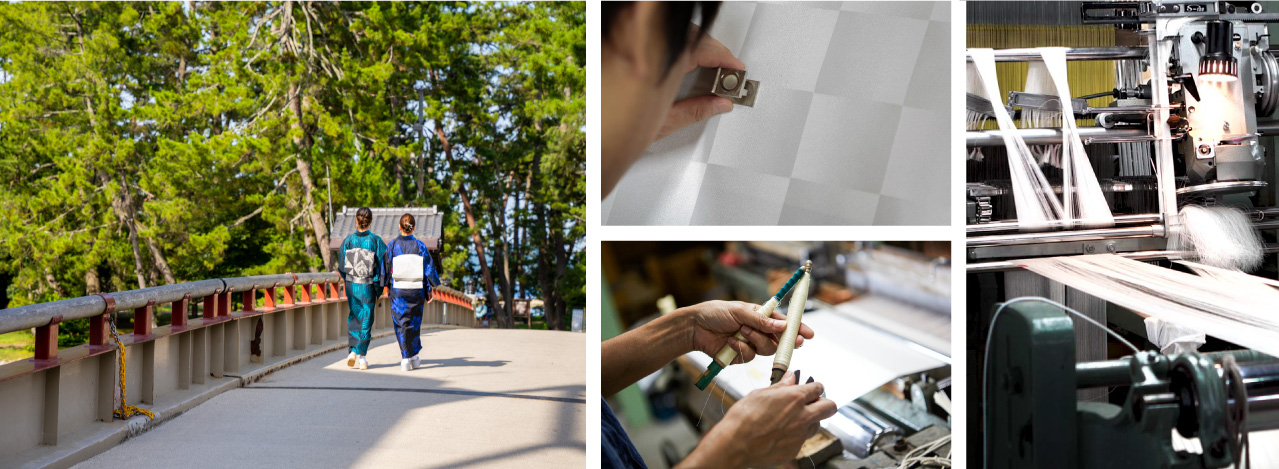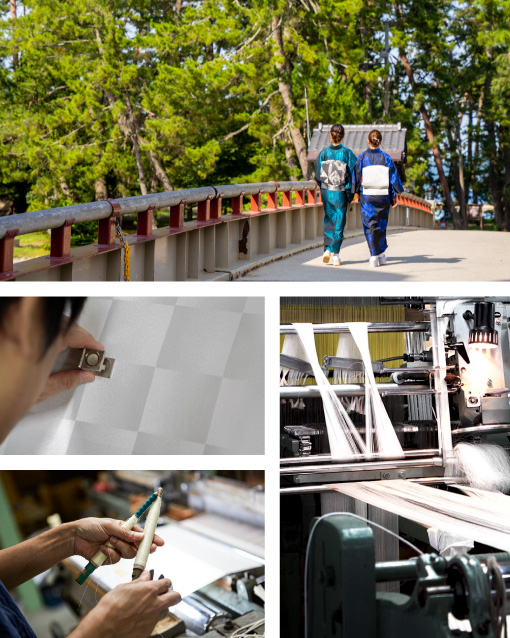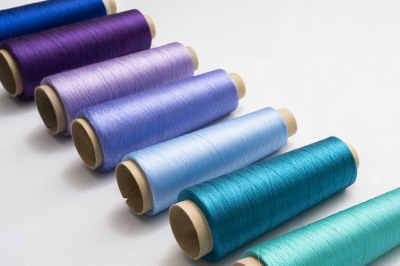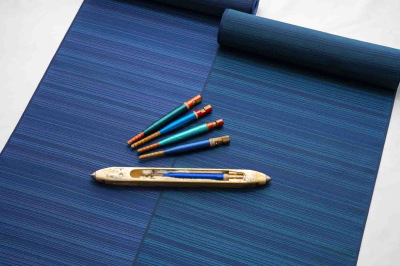 HOME
ABOUT
CREATE EBARA
GALLERY
GALLERY (Wide Textile)
SUSTAIN TANGO
EBARA BRAND
INNOVATION
VISIT TANGO
ONLINE STORE
Weaving Experience
CONTACT
HOME
ABOUT
CREATE EBARA
GALLERY
GALLERY (Wide Textile)
SUSTAIN TANGO
EBARA BRAND
INNOVATION
VISIT TANGO
ONLINE STORE
Weaving Experience
CONTACT
© 2019 Ebara Sangyo Co.,Ltd.

 HOME
ABOUT
CREATE EBARA
GALLERY
GALLERY (Wide Textile)
SUSTAIN TANGO
EBARA BRAND
INNOVATION
VISIT TANGO
ONLINE STORE
Weaving Experience
CONTACT
HOME
ABOUT
CREATE EBARA
GALLERY
GALLERY (Wide Textile)
SUSTAIN TANGO
EBARA BRAND
INNOVATION
VISIT TANGO
ONLINE STORE
Weaving Experience
CONTACT
© 2019 Ebara Sangyo Co.,Ltd.
伝統技術を受け継いでいくこと。
それは携わる人間、企業の使命でもあります。
しかし、日本のすばらしい伝統技術の多くは
職人の後継者問題に直面し、
継続していくのが困難なケースも
少なくありません。
私たちは、create ebara という
企業として体系化したときから、
この問題を最重要課題として取り組んできました。
それを実現するには、この伝統技術を
しっかりと土地に根差した“産業”にしなければなりません。
職人はその技術を磨き、
よりよい生地をつくり続ける。
その価値に見合った価格でお買い上げいただく。
その報酬で、さらに職人を育て、
より多くの価値ある生地を提供する。
産業としてのあたりまえの構造が、
“伝統を受け継ぐ”ということの答えでした。
Passing on traditional skills is the mission
of all the people and businesses we work with.
However, many of Japan's beautiful traditional skills
are facing the problem of a lack of successors,
leading to many cases of skills being in danger
of disappearing altogether.
From the time our company, "create ebara," was formed,
we've taken this problem very seriously.
In order to pass on traditional skills,
they must become a part of production
with deep roots in the community.
Craftsmen polish those skills
and continue to create better fabrics.
When you purchase products for a price worthy of this mission,
we can train more craftsmen
and produce fabric with greater value.
The simple structure of the manufacturing industry
is our means to pass on tradition.
多くの伝統技術にとって、
それは簡単ではありません。
そのためには、技術・商品が文化として定着し、
多くの人々に受け入れられなければいけません。
職人は、技術に見合った報酬を手にし、
生活や将来の心配をすることなく
ものづくりに没頭できる
環境でなければいけません。
そして企業は、多くの人にその魅力、
その価値を知ってもらい、
お届けできる体制を整えなければいけません。
産業として発展できるサイクルをつくっていく。
それができず、失われてしまった
技術も少なくないでしょう。
しかし、私たちはそれを、少しずつ実現しています。
私たちにしかできない、
よりよい商品を開発し続ける。
それを日本の文化として、
日本のみならず世界へ向けて発信する。
職人は正当な報酬を受け取り、
さらに魅力的な生地をつくる。
私たちが培ってきたこの技術を
より大きな産業にするために、
これからも努力を続けていきます。
For many traditional skills,
this is no easy task..
For that to happen, the skills and products
must become ingrained in culture, accepted by many people.
We must create an environment in which
craftsmen can earn an income appropriate for their skills,
so they may go about their work
without the need to worry about their livelihood.
Furthermore, businesses must convey
the value of this to many people,
and build up a system to deliver their goods.
We must produce a cycle that lets us grow as manufacturers.
There are many skills which have been unable to do this,
and have vanished from this world.
We, however, are succeeding in this vision.
Continuing to develop better products
that only we can deliver.
Spreading this culture not only to Japan,
but to the entire world.
Providing fair pay to our craftsmen,
so they can make even more appealing fabric.
We continue to put our utmost effort
into taking these skills which we have developed
and turning them into a larger industry.


私たちが着物の生地をつくり続ける中で、
織り機での工程上、
ロッドの切り替え時に少しずつシルクが余り
一反分使えないことがあります。
余った複数のシルクを集め再利用することで、
今までとは違った色彩の新たな魅力を持つ
生地へと生まれ変わります。
これまでは活かしきれなかったシルクを
余すことなく生地として利用し、
素材を無駄にしない地球環境へも配慮した
取り組みを実現しています。
In the process of making our kimono fabric,
there can be a full bolt's worth of silk left over
when changing the rods on the looms.
By collecting and reusing this silk,
we can revive it as a fabric with a brand new appeal.
We are using this formerly unusable silk to make fabric
in order to eliminate waste and be mindful of the environment.

余ったシルク
Leftover silk

余ったシルクを横糸に巻き、
織り機で生地を織っていきます。
We wind leftover silk into the weft
to create fabric with our looms.
私たち伝統産業に携わる者として
もっとも重要なこと。
それは、この技術によって、
丹後の街が発展していくことです。
技術を育て、人々を育て、街を育てる。
地域に根差す企業として、
この街とともに生きていく。
それが私たち create ebara が目指す
「サステナブル」な取り組みです。
The most important thing to us
as people involved in traditional manufacturing
is using these skills
to develop the community of Tango.
Nurturing skills, people, and the community.
As a business with deep roots in the region,
we live in harmony with the community.
That is the "sustainable" operation
that we at create ebara strive for.
SDGs
8
働きがいも
経済成長も
世界や日本の人々が喜ぶシルクの生地を創り出し、もっともっと製造メーカーや職人が尊重される働きがいのある会社を目指します。そして日本や世界の経済成長に貢献していきます。
SDGs
9
産業と技術革新の
基盤をつくる
日本の伝統衣装「着物」をふだん着やファッションとして着ていただけるよう努力し、その着物のシルクジャカードの技術で世界の人々が喜ぶテキスタイルを創り出し、日本にそして世界に新たな産業を生み出す努力を致します。
SDGs
10
住み続けられる
まちづくりを
create ebara のシルクを世界中の人々が、この町に見に来ることにより、宿泊、食事、観光、そしてシルクの販売の元に町が潤い、自然の中で皆が生き生きと住み続けられる、まちづくりを目指します。
SDGs
11
つくる責任
つかう責任
地球環境に配慮し、シルクの生地をつくる責任とシルクをつかう責任を考えながら、サステナブルな(持続可能な)企業を目指します。
SDGs
8
Meaningful work
and economic growth
By producing silk fabric loved by both Japan and the world, we aim to create a society in which makers and craftsmen garner greater respect, as well as contribute to Japan's economic growth.
SDGs
9
Building the foundation
of production and innovation
We put our utmost effort into promoting the use of traditional Japanese kimonos in both casual wear and high fashion, using Jacquard machine skills to produce world-class textiles, and producing new manufacturing in Japan and the world.
SDGs
10
Building a community
that will live and thrive
create ebara's silk will bring people here from across the globe, and the lodging, dining, tourism, and silk industries will invigorate this area, producing a community in which we can live vibrantly within our natural environment.
SDGs
11
Responsible production
responsible consumption
We aim to be an environmentally-minded, sustainable business which focuses on both the responsible production of silk and the responsible use of silk.